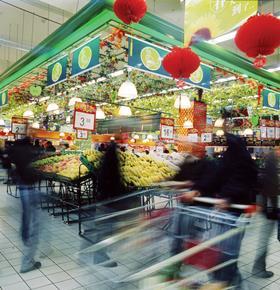
As Kipling’s poem The Ballad of East and West recalls, Britain is mired in history with Asia. Trade, colonialism, and not least tea, formed Britain’s empire, often through violent means. Thankfully things are different these days. Agricultural produce, however, has slipped down the pecking order from the old era of tea and clipper ships.
For Britain, Asia has long been the “too far East” market for fresh produce. But things are changing. The continent’s upheaval towards a middle-income population has brought huge demand for fresh produce, a pull felt across the world in all commodities. Larger fruit and veg industries, from Italy to Chile, are already exporting millions of tonnes of produce to Asia.
But for the UK, is the Asian market a bridge too far? And is it even an opportunity Britain wants? With just 10 per cent of fruit home grown, and 60 per cent of vegetables, it’s not as if the UK has saturated its own market. Nevertheless where there is demand on that scale, forward-looking companies recognise it is a reality they must reckon with. Rachel Montague-Ebbs, Soloberry’s group head of brand, says: “Our strategy is not just about the next few years but the next 10-15 years.”
Here's our take on where and how British companies can harness new opportunities in Asia:
China and India
Fertile conditions for growers
Following in the footsteps of other commodities, China is quickly becoming a major opportunity for growers, as their huge populations seek more fruit and veg. UK berry growers Haygrove and S&A Produce are both trialling growing operations in China, while Soloberry is also developing supply chains to the world’s largest market. “China is an attractive location for growing; we see more farms going up there for production as well as breeding and development,” says Montague-Ebbs. “The same can be said in India: there is a demand for locally grown product and there are many regions that grow strawberries, for example, very well.” Another UK company, Jupiter Marketing, recently ranked as one of Britain’s fastest-growing companies, has added success on the back of growing table grapes in India, and says it is developing a lot across Asia at the moment.
Middle East
Brands and partnerships key
Rapid development with good transport links means countries like Saudi Arabia and oil states like the United Arab Emirates are entering into the global fresh produce market. Consumers are increasingly health conscious too on the back of a growing obesity crisis driven by fast food.
In this context, branded and pre-prepared health products are a strong way of entering the market. G’s Fresh has partnered with Australian growers OneHarvest in the Middle East market to roll out beetroot juice brand Love Beets, which can be promoted through popular online channels like Alibaba.com. “The Middle East region has a clear gap with some of our added-value products and is looking for new innovation and ideas that offer convenience and fresh and healthy products,” says Jen Danby, global brands marketing director of G’s. Likewise Soloberry is keen to build a brand reputation overseas. “We wish to continue to grow our trademarked Soloberry brand in Asia. Asia, and in particular China, is a fast-moving market and the interest for us is in e-commerce and the presence of our Soloberry brand in this new-style marketplace for our products.”
Indonesia, Thailand, Vietnam
Utilising Britain’s skillsets
One of Britain’s big assets is a strong agri-tech and knowledge base. Research groups like The James Hutton Institute have built Britain’s reputation for innovation, with new varieties of seed potatoes long being one of Britain’s primary exports to Asia. Indonesia, Thailand and Vietnam are all growing recipients from companies like Grampian Growers, who say they are expanding into Asia as they aim to build on success in the Egyptian market.
China is also a key region for British agri-tech collaboration with numerous international projects seeking solutions for common problems. Demographic issues in China of people moving to the cities, and an ageing population mean Europe is not the only one with a labour shortage. “The challenges in the UK and Asia are all common, we’re all facing the same problem with the same solutions,” says Simon Pearson, Professor of Agri-Food Technology at the University of Lincoln. Large cross-industry research driven by Innovate UK, The Science and Technology Facilities Council, and Agri-Tech in China Newton Network are utilising the best of both countries’ knowledge, not to mention opening the way to a huge market for British tech firms.
Japan
Provenance is a big selling point
It doesn’t get much further east than Japan, but surprisingly the UK has one of its strongest agricultural export links to the land of the rising sun, shipping thousands of tonnes of dried peas to be used in snacks, alongside neighbours like China, Malaysia and Thailand. Franek Smith, president of the British Edible Pulses Association, says Asian countries recognise the provenance of British produce. “They like the English provenance due to food security; they know they are going to get a [safe] raw material.” Jen Danby, global brands marketing director of G’s echoes Smith’s comments. “British products have strict production, processing and packing rules and there is a lot of trust in British products by the end consumer in this region,” she says.



